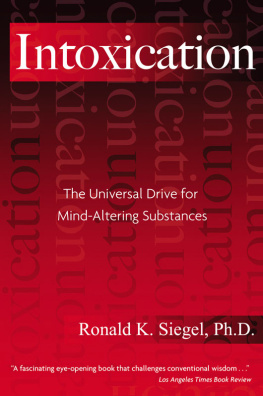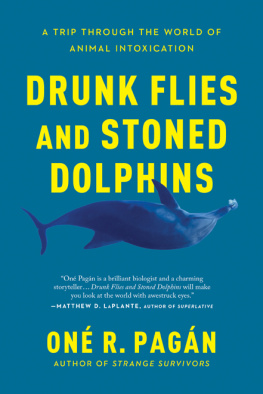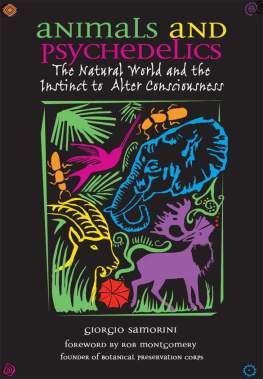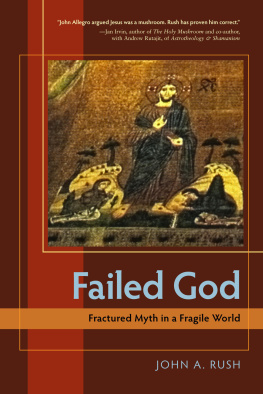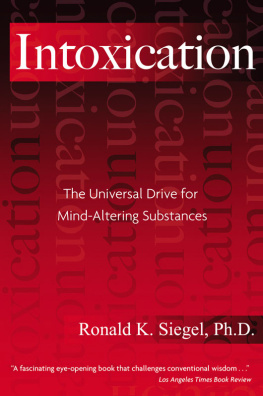Critical Acclaim for
INTOXICATION
Siegels book will be controversial, but his perspective on intoxication as a fact of nature and not just of culture cannot be ignored. INTOXICATION should be required reading for the nations drug czar.
L OS A NGELES T IMES B OOK R EVIEW
Siegels book may draw spirited attacks... but his ideas are respected by drug authorities.
T IME
A rich feast of material...
K IRKUS R EVIEWS
[Ronald K. Siegel] knows more about how drugs work than anyone else alive....
an intrepid researcher [and] cartographer of consciousness.
O MNI M AGAZINE

Acknowledgments
My thanks are first due to the late Ada E. Hirschman, my chief research assistant, who helped organize the dozens of file cabinets that filled with data over the twenty years of this research. She retrieved many rare references, provided expert translations, and managed the office during my many field trips.
I was extremely fortunate in having several remarkable students who assisted with observations in the laboratory and field. For contributing their energy and talent to the research I thank Mark Brodie, D.D.S.; Kirk J. Brower, M.D.; Laura A. Freberg, M.A.;Jean Poole, B.A.; Pauline B. Popek, M.A.; and Susan E. Valadez, M.A.
For their expert assistance in the field, and for helping with everything from animal observations to translations with native tribes, I am grateful to the following: James Amundson (Mexico); William Bergin, D.V.M. (Hawaii); Lawrence Blair, Ph.D. (Malaysia and Indonesia); Gary L. Bogue (California); Enrico C. Chavez, M.D. (Mexico); Peter R. Collings (Mexico); Steve Craig (California); Jos Luis Diaz, Ph.D. (Mexico); Donald Dooley, D.V.M. (California); David Dorrance, M.D. (Mexico); Robert Ellsworth, Ph.D. (Yemen); Howard Johnson (California); Philip Lowenthal (Hawaii); Bruce Moffitt (Australia and New Guinea); and the late Ivan Tors (Africa and Asia). Thanks are also due to the following individuals for providing helpful information on animal-plant interactions: T. F. Corfield (Kenya); E. C. Goss (Kenya); W. Harding (Africa); P. Moulet (France); and D. S. Sade (Cayo Santiago).
I wish to thank the following for logistical support and assistance with the field research: Alexander Lindsay Junior Museum, Walnut Creek, California; Centro Coordinator para el Desarrollo de la Rgion Huichot, Tepic, Nayarit, Mexico; U.S. Department of State, U.S. Drug Enforcement Administration; Instituto Ecuatoriano de Adiccionologa y Psicoterapa, Guayaquil, Ecuador; Ginseng Research Institute, Seoul, South Korea; Lion Country Safari, Laguna Hills, California; Max Planck Institut fr Psychiatrie, Munich, West Germany; Ministerio de Salud, Divisin Salud Mental, Bogota, Colombia; Pan American Health Organization; Peruvian Ministry of the Interior; San Diego Zoo; San Jose Police Department; U.S. Forest Service; Stanford Outdoor Primate Facility; and the World Health Organization.
For assistance in library research and for access to rare documents in their possession I am grateful to Michael Aldrich, Ph.D., Michael Horowitz, and William Dailey of the Fitz Hugh Ludlow Memorial Library, San Francisco. I thank the staff at the following libraries and museums for generous help in finding references: American Institute of the History of Pharmacy; Harvard Botanical Museum; Historic New Orleans Collection; Illinois State Historical Library; Library of Congress; Lloyd Library; Mutter Museum of the College of Physicians of Philadelphia; National Library of Medicine; La Pharmacie Franaise; Historical Pharmacy Museum, New Orleans; Pharmacy Museum, University of Minnesota; and the UCLA Biomedical Library. I am particularly grateful to John V. Dennis and Leonard A. Eiserer, Ph.D., for sharing references on alcohol intoxication in birds; to James T. Hickey, curator of the Lincoln Collection at the Illinois State Historical Library, for helpful services; to John Mann for providing a collection of contemporary folklore; and to my late mother, Frieda Siegel, for her care and diligence in providing newspaper clippings. A number of office assistants joined the task of collecting research materials, and I am grateful to Stella Gardner, Debra Hartley, Lori Hack, Beverly Lowe, and Erin McCormick.
Over the years I have worked with several colleagues in laboratory studies that are referenced in this book. I am indebted to the following for the opportunity to work and learn with them: Werner A. Baumgartner, Ph.D.; Joan M. Brewster, Ph.D.; Ellen R. Gritz, Ph.D.; Barbara E. Gusewelle, M.D., Ph.D.; Werner K. Honig, Ph.D.; Murray E. Jarvik, M.D., Ph.D.; Cheryll A. Johnson; Gerald D. Robinson, Ph.D.; and Ian P. Stolerman, Ph.D. I also wish to thank the following for technical assistance with the research: Tom Hesterberg, Virginia Hill, Monroe A. Lee, and Charles Scott.
For helpful discussions along the way, I thank: Robert Byck, M.D.; the late Sidney Cohen, M.D.; James A. Duke, Ph.D.; William Emboden, Ph.D.; Lynn Fairbanks, Ph.D.; Dino Fulgoni, J.D.; John Garcia, Ph.D.; William L. Hearn, Ph.D.; Jack Herer; Oscar Janiger, M.D.; Reese Jones, M.D.; Weston La Barre, Ph.D.; the late William H. McGlothlin, Ph.D.; the late Alan Nodell; G. Reichel-Dolmatoff, Ph.D.; Marlene Dobkin de Rios, Ph.D.; Shepard Siegel, Ph.D.; Neil B. Todd, Ph.D.; J. Thomas Ungerleider, M.D.; Andrew Weil, M.D.; Louis Jolyon West, M.D.; Johannes Wilbert, Ph.D.; and Roy A. Wise, Ph.D.
I also want to thank Reid Boates, my literary agent, and Joyce Engelson, my editor, for their encouragement and advice throughout the writing. I am equally grateful to Stephen Peters for his friendship and help. I want to give special thanks to Erica Blomquist, my project editor at Inner Traditions, for her careful attention to editing details that have greatly improved the quality of this edition.
Finally, I thank the many local people who joined our teams in the field and helped cook, carry equipment, and care for the animals and team members. Their support was greatly appreciated. I also extend my appreciation to the nurses, residents, and staff members at the UCLA Center for Health Sciences who provided support services for the clinical studies. And my thanks to the many informants, respondents, and subjects, human and nonhuman, who helped in this pursuit.
I am particularly grateful to Claude, Alex, Lucy, Pupi, and all the other nonhuman primates in my studies. They sensitized me to the plight and rights of laboratory animals, propelling me to shift my research out of the laboratory and into the field, where intoxication is not only natural but right.
Contents

Preface
There is a silent spring of intoxicants that flows through our lives and bodies. Whether we wake up with a sip of coffee or a sniff of cocaine, take a break with a cigarette or a beer, relax with a cocktail or marijuana, drift to sleep with a pill we purchased at the pharmacy or from our neighborhood dealer, we use drugs to change the way we feel. Nobody wants this to be unhealthy or dangerous. Nobody wants people to live out their lives inside crack houses, to die from tobacco cancer, or to be killed by drunk drivers.
Over the years since I wrote the first edition of this book, most governments of the world have continued to wage a war on drugs. The strategy has been to reduce supply and demand, a policy established by President Richard Nixon when he declared the first war on drugs in 1971. His idea was hardly original but reminiscent of every failed attempt to prohibit intoxicating drugs throughout the history of civilization.
Next page
